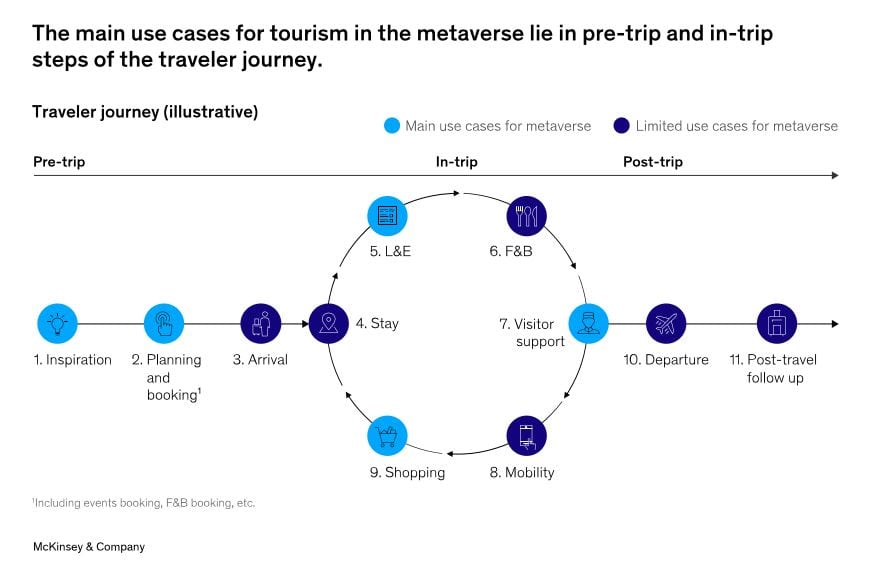Research Unveils $20 Billion Tourism Opportunity in the Metaverse


In Brief
McKinsey’s research suggests that the travel industry could gain over $20 billion by 2030 from metaverse applications.
The main use cases for the metaverse in tourism include leisure and entertainment, inspiration and planning, visitor support, shopping, and booking.
Forward-thinking tourism players can explore virtual event centers and recreations of iconic landmarks to position themselves at the forefront of metaverse disruption.

The metaverse fueled by VR/AR technology has the strong potential to reshape our reality, including traveling. According to research by McKinsey, the travel industry could gain more than $20 billion by 2030 from the metaverse’s immersive and captivating offerings.
“Imagine a future where your travel choices have no geographic constraints. Where you can join your friends in the front row of a concert by your favorite star—but the crowd is 300 million strong, your friends are on the other side of the world, and it’s all happening at the Great Pyramid of Giza. Later you’ll do some shopping at the virtual souk and take a digital Nile cruise, before teleporting back home in an instant,”
McKinsey envisioned metaverse-powered travels.
Early trends in metaverse applications showcased the technology’s possibilities that redefine exploration. For instance, French start-up Histovery used augmented reality to create an immersive exhibition on the history of Notre Dame de Paris. Meanwhile, MGM Resorts International turned to virtual reality to enhance staff training and onboarding. Virtual platforms like ZEPETO World and the BCB Group’s metaverse city offer virtual travel experiences to global landmarks, fostering edutainment and retail opportunities. Moreover, Saudi Arabia’s Royal Commission for AlUla placed the ancient city of Hegra in the metaverse, allowing digital tourists to explore its wonders.
The report highlights that the main use cases for the metaverse lie in leisure and entertainment, inspiration and planning, visitor support, as well as shopping and booking. These areas show significant potential for leveraging the metaverse to enhance the traveler experience.
Strategic Steps for Travel Industry in the Metaverse

McKinsey argued that forward-thinking tourism industry players could position themselves at the forefront of disruption. The strategies by early metaverse adopters fall into two categories: virtual event centers and recreations of iconic landmarks.
Virtual event centers have already demonstrated potential, attracting business gatherings and entertainment with ticket sales, attendance fees, and retail opportunities. On the other hand, extender reality (XR) landmarks provide immersive spaces where visitors can explore, socialize, shop, and learn while gaining exposure to lesser-known destinations.
After overcoming challenges like interoperability, data security, and device availability, travel businesses can plot potential traveler journeys and collaborate with metaverse and retail platforms, communications channels, and designers. McKinsey wrote that by embracing the metaverse early on, travel companies could secure partnerships and experiments and position themselves for success in the future of travel.
In January, Booking.com’s research surveyed over 24,000 travelers from 32 countries, revealing that 43% plan to use VR for travel inspiration in 2023. China (75%), Thailand (72%), and India (70%) lead in VR adoption. In addition, VR experiences can influence destination choices, with 46% of respondents more willing to visit previously unconsidered places after exploring them virtually. While 35% express interest in multi-day VR travel, 60% still find traditional traveling more fulfilling.
Read more:
- Booking.com Unlocks the Future of Travel and Foresees NFTs Making Waves in the Business World by 2026
- The Impact of Artificial Intelligence on the Travel Industry
- How will the metaverse change the travel experience in 2023?
Disclaimer
In line with the Trust Project guidelines, please note that the information provided on this page is not intended to be and should not be interpreted as legal, tax, investment, financial, or any other form of advice. It is important to only invest what you can afford to lose and to seek independent financial advice if you have any doubts. For further information, we suggest referring to the terms and conditions as well as the help and support pages provided by the issuer or advertiser. MetaversePost is committed to accurate, unbiased reporting, but market conditions are subject to change without notice.
About The Author
Agne is a journalist who covers the latest trends and developments in the metaverse, AI, and Web3 industries for the Metaverse Post. Her passion for storytelling has led her to conduct numerous interviews with experts in these fields, always seeking to uncover exciting and engaging stories. Agne holds a Bachelor’s degree in literature and has an extensive background in writing about a wide range of topics including travel, art, and culture. She has also volunteered as an editor for the animal rights organization, where she helped raise awareness about animal welfare issues. Contact her on agnec@mpost.io.
More articles

Agne is a journalist who covers the latest trends and developments in the metaverse, AI, and Web3 industries for the Metaverse Post. Her passion for storytelling has led her to conduct numerous interviews with experts in these fields, always seeking to uncover exciting and engaging stories. Agne holds a Bachelor’s degree in literature and has an extensive background in writing about a wide range of topics including travel, art, and culture. She has also volunteered as an editor for the animal rights organization, where she helped raise awareness about animal welfare issues. Contact her on agnec@mpost.io.





















































